Debra Messing has a problem that most actresses would kill for. When
you are known indelibly for a role which hits the pop-culture jackpot,
sometimes itís not easy to get the public to see you as anyone else.
Messing spent eight years playing Grace Adler on Will and Grace Ė
a kooky, slightly neurotic but funny interior decorator with a gay best
friend Ė who was one of the best-known sitcom characters of the decade.
After dabbling in films (The Wedding Date, Along Came Polly,
Lucky You), in 2007 Messing took the lead role in a surprisingly popular
miniseries, The Starter Wife. Messing played Molly, a Hollywood
spouse dealing with the break-up of her marriage Ė trying to juggle
motherhood, romance and the aspiration to become a writer. The
miniseries was not only a huge hit, it also won eleven Emmy Awards.
Success like that canít be ignored; therefore a year later, The
Starter Wife has been transformed into a series. With most of the
original cast returning (and this time actually filming in Los Angeles,
rather than the Australian sets of the miniseries), the new series casts
a jaded eye over the ridiculousness of the Hollywood lifestyle at the
same time as it gives us a heartfelt look at Mollyís attempts to find
friendship, love, respect and the perfect boots.
Recently Messing sat down with us Ė as well as some other websites Ė in
a conference call to discuss her career and her experiences on The
Starter Wife.
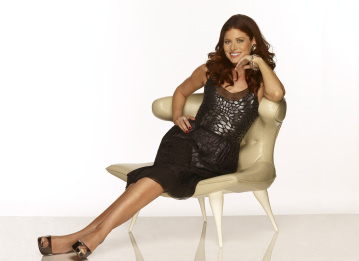 What about your role
challenges you?
What about your role
challenges you?
Oh, everything about Molly challenges me and thatís why I love playing
her so much. Everything thatís going on in her life is new and
uncharted territory for her. Her life is starting over at
40,
everything from the dynamic between her new ex-husband, having to
negotiate that new relationship with shared custody, to dating for the
first time in over ten years, which is awkward and funny and scary, to
having to discover an occupation that will support she and her daughter,
and negotiating living in the same community that has ostracized her.
Everywhere she goes, she is an outsider or she is trying to get her
footing. Itís incredibly challenging.
With (series creators) Josie
(McGibbon) and Sara (Parriott) doing the writing, the same writers who did the
miniseries, itís just ó
every day is a ride, everything from high comedy
to very poignant still simple, accessible emotional moments.
How long can you see
yourself playing this role?
Oh, gosh, as long as theyíll let me. We just finished our first season,
like two weeks ago and I was sobbing the last day, and thatís unusual
for me and I think it was a clear sign that itís a special show. Itís a
special group of people and itís really touched my heart and has
inspired me creatively and has turned out to be a much more fulfilling
experience than I ever imagined it could be.
I also think you donít have to have seen the miniseries in order to
start watching the series because everything is new. Starting over at
40, it can go anywhere. And especially in the world of Hollywood in
which we do social satire and we have a lot of fun poking fun at the
values and priorities that are askew there, I think that there will be
fodder for comedy in that world forever.
Molly is a complicated character, which is why I love playing her.
Nothing is clean and simple. Her relationship with her ex-husband is
messy. She still is kind of taking care of him, even though heís hurt
her. Nothing is easy, so I think that especially with the team of
writers and the group of actors we have I think that we could go until
Molly is in the old home in Beverly Hills.
When you were filming
the miniseries did you have any thought or maybe even any inclination
that this might eventually go to series or was it after?
Absolutely none. No, absolutely none. It was adapted from a novel and
it was finite and we finished the novel. I think that what happened was
that when the miniseries got ten Emmy nominations it just sort of
shocked everybody, including myself. USA called and said I think weíve
touched a nerve. I think that thereís something here that is modern and
relevant and has not been explored in TV or film before. At least
thatís what all the people who stop me on the street, the people who
say, ďThatís me. Iím a starter wife,Ē or ďIím a starter husband,Ē
thatís what Iíve been hearing the most is like thatís me and youíve
never seen anything on TV that really shows my life and my struggles.
I think that all bets were off after those ten Emmyís and we sat down
and said, ďOkay, can this be a long running series?Ē Once we realized
that all the things that worked from the miniseries would be maintained,
and that we just wanted to build on that and expand the world of The
Starter Wife and add new characters and have fun with the
storylines, we realized that it could have a long life as a series. Iím
so grateful to USA that they did that.
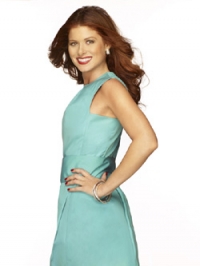 The Starter Wife uses a lot of fantasy scenes from movies. Which one
was your favorite?
The Starter Wife uses a lot of fantasy scenes from movies. Which one
was your favorite?
Oh, goodness. Itís so hard to pick a favorite because they just kept
getting better and better. Right off the top of my head, Iíd have to
say the Sharon Stone in Basic Instinct, which is in the last
episode of the series, and playing Carol Channing singing, instead of
ďHello, MollyĒ singing ďHello, Dolly.Ē Singing and dancing and doing a
big song and dance number Ė that was a highlight for me.
Which one have you
not done yet that you would like to do, do you think?
Thereís a whole laundry list of ones Iíd like to do. One of them is
Gone with the Wind, just because where we shoot in Los Angeles is
where Gone with the Wind was shot and I think sort of an homage
to our location would be fun. I also would love to do a silent movie
with subtitles. I think that would be really fun.
What really interests
me, .... you already touched on this a little bit, but I actually am a
writer that started over as a writer at 40, so it kind of really
interests me what youíre doing with this character of Molly, so Iím
wondering how itís going to work out. Is there anything you can tell
us, if she does become successful as a writer eventually or can you lead
us into that a little bit or tell us one of her struggles that she might
come up with in this season that you Ö.
Well, what I will say is that her writings in her journal have been sort
of a social commentary, a comic social commentary of her own and that
gets stolen and from that experience attention is brought to Molly and
some unusual professional opportunities arise. It will certainly test
Molly in terms of whatís important to her and ethics and sort of being
thrown into the middle of the whole Hollywood game. Sheís going to have
to be dealing with her ex-husband in the professional world for the
first time. So there are some fun, new dynamics that are explored.
Letís just put it this way, her life is not going to become a fairly
tale within ten episodes. Even if she gets a job itís not going to be
the answer to everything or sheís not going to be catapulted to
stardom.
Iím imagining then
that thatís what you would want. You wouldnít want a character that
would have it all figured out in one season.
No, no, thatís what I respond to about Molly is that she doesnít have it
figured out and that she is written in a way that sheís a fighter and
sheís a survivor, but sheís constantly butting up against obstacles, and
to me thatís real life. I love the juxtaposition of the fantasy world
of Hollywood and the Utopia that is presumed in that world and the very
real and accessible daily struggles in every aspect of the protagonistís
life, of Molly.
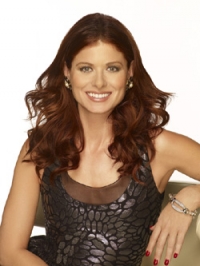 How did it come about
that youíre also now executive producing the show?
How did it come about
that youíre also now executive producing the show?
Well, during the miniseries I was lucky enough to be invited in to be a
collaborator, a creative collaborator. So I had a lot of say in terms
of the rewrites and the look of the show and the casting, so it was a
natural progression because itís the same writers that are running the
show, and the three of us we just got on like gangbusters and respect
each other and love each other very much.
In addition to it being a natural progression, though, honestly, I think
it just made it easier for me to sign on for potentially another 6.5
years onto a series, knowing that the title executive producer does add
some certain creative protections for me, in that, as executive producer
my opinions and my voice will be at least considered if I feel like
something is changing in the show as time is going on that is important
to me or that I feel like is essential to the show or if they want to
take it in a direction that Iím not comfortable with. Just knowing that
I have that protection allows me just to dive in with 100% excitement
and commitment and energy into the entire experience.
Finally, itís turned out to be something that I actually am good at.
When youíre an actor youíre just focusing on yourself all the time on
the set, working 14 hour days and thinking about your character and as
executive producer I have to look at the whole and not just at my
stuff. Itís sort of right brain, left brain work and itís exhausting,
but I find it really, really just stimulating and gratifying.
What did you guys all
find as producers and actors and crew to be the biggest hurdles to
transferring from a miniseries to series?
I didnít feel many hurdles. Iím an executive producer who is focused on
just keeping the creative aspects of it pure. I could care less about
the money and if things are too expensive, Iím just like, but, we want
that actor. Iím always just keeping focused on letís just keep
elevating the show in every way possible. Iím sure the money ended up
being the biggest hurdle because shooting in Australia was significantly
less expensive than shooting in Los Angeles. I knew that if we were
going to be making this a series that it would have to stay in Los
Angeles, so itís prohibitive. Ninety percent of the TV shows nowadays
donít shoot in Los Angeles because itís expensive, so I would imagine
that was it but I didnít feel that. That never really trickled down to
me.
It was really just trying to get, figure out how many of the cast
members we could get back because it was a full year later. Peter
Jacobson, who played my ex-husband, Kenny, was already contracted on
House, so he wasnít able to come back. So it was like okay, now we
have to do a search of finding one other person who can actually do the
role of Kenny, which I think is the hardest role in the whole show, and
we found him with David Alan Basche. Heís incredible.
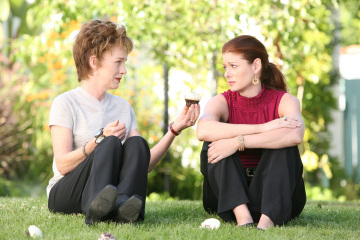 The character of
Grace was so much fun, whereas your role as Molly is more deliberate in
tone and speech. But the visual quirks that Grace had also seem to be
taking subtle residence with Molly as we progress, so Iím wondering is
it a little crossover character trait that cannot be avoided, perhaps,
or perhaps theyíre Debra quirks just oozing to the surface as you get
older.
The character of
Grace was so much fun, whereas your role as Molly is more deliberate in
tone and speech. But the visual quirks that Grace had also seem to be
taking subtle residence with Molly as we progress, so Iím wondering is
it a little crossover character trait that cannot be avoided, perhaps,
or perhaps theyíre Debra quirks just oozing to the surface as you get
older.
Thatís a good question. When I first got off of Will and Grace
and we were doing the miniseries, I took the director aside and said,
ďIf you see Grace sneaking in, I want you tell me because Iíve been
doing it for eight years. Iím sure that I donít even realize it a lot
of the time.Ē It turned out in the miniseries not to be an issue, but
what I have found is that the writers like to put my character into
situations that elicit physical responses, I think in large part because
theyíve seen me do that before and they know that I have fun with it and
I have an affinity for it.
So I like to feel that Molly is experienced by viewers as it is
experienced by me as a completely different character, but Debra is also
the actress whoís playing these characters and I have a certain, I
guess, aesthetic when it comes to comedy and what I think is funny.
That might sort of keep the thread throughout much of my work. I donít
think that Debra is very much like Grace and I donít think Debra is very
much like Molly, but I think Debra is in both of them and perhaps itís
in that way.
I can see that.
I think you said you had the same writers for this series. Now are they
game for writing a projected series now, it still is in the key adult
demos, of course, that were 18 to 49 and such like that, which is a
great span of demographic? And have they ever mentioned, perhaps, that
your diary could one day be a real life general public sale diary in a
bookstore for Christmas or something?
Oh my goodness, what a brilliant idea. No, that hasnít been discussed,
but Iím sure after today it will be.
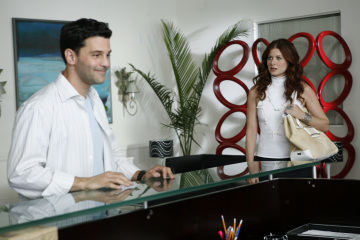 Iíd like
royalties sent down the line.
Iíd like
royalties sent down the line.
And you will deserve them. In terms of diving into a series, Sara
Parriott and Josie McGibbon are brilliant and they were the ones who
said to me, ďWe can do this. We want to do this.Ē And we sat down and
we thought about long term, whether or not there was enough there to
expand into a full series. We all were unhesitant. We all felt
absolutely there was. Theyíve proven to be really great at it. Theyíre
just prolific. They write incredibly quickly and we were never behind
the eight ball in terms of our scripts.
Itís been an effortless transition for them because I donít know if you
notice, but they had done mostly films prior to the miniseries. They
wrote Runaway Bride for Julia Roberts. So this is a new medium
for them, but I think when youíre a talented writer youíre a talented
writer.
All the other actors
on the show always have the most wonderful things to say about you, so
how does everyone maintain such a good chemistry on set?
Well, itís nice to hear that people have nice things to say about me. I
love our cast and I was in every audition, every final thing. In
addition to, our first priority was finding the best actors for that
particular role, but at the same time we were very much aware that we
were going to be spending fourteen, sixteen hours a day with these cast
members. And it was important to feel like, that we were getting
together a good group of people, good human beings who are respectful
and have a good work ethic and are passionate about what theyíre doing
and have a great sense of humor.
We were able to do that and then you put us all together and there just
happened to be great chemistry, which you canít predict. We were just
lucky enough that it happened. So we get along incredibly well and we
laugh a lot. The hours are hard and there are challenges with working
that hard, and itís wonderful to know that everywhere you look, there
are people who have your back and who are there to give you the
emotional support that you need or to get you to say, okay, youíre
falling asleep on your feet. Okay, do I have to do a little jig to make
you laugh, or whatever needs to be done. So yes, itís a really great
group of people.
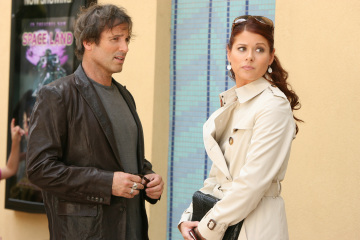 Iím sure itís
great when everything can fit together like that. Do you have a
favorite on-set moment so far?
Iím sure itís
great when everything can fit together like that. Do you have a
favorite on-set moment so far?
Oh goodness, I have a memorable moment. I donít know that it was a
favorite. It was doing the Basic Instinct fantasy where I was
Sharon Stone with the famous uncrossing of the legs interrogation
scene. This was the last episode and we were doing it, I was doing it
in front of all the male cast members and I could just tell that
everyone, including all the crew, were kind of tense because they didnít
know what was going to happen. Obviously I wasnít going to go the full
mile and not wear underwear while I was doing the scene. But I did know
that given the nature of the scene, that everyone was going to have to
be staring at my crotch for ten hours and that people were going to be
shy and embarrassed because everyone is like family now.
So I decided to do a practical joke to try and break the tension and to
make everyone relax. So I had white panties made up with these big
block pink letters that said ďSay please,Ē hoping that when I uncrossed
my legs and the cast and crew saw, that they would break up laughing,
that it would ruin the take, everyone would just acknowledge how sort of
weird and funny this whole thing is and then we would be able to go on
and for me to say, ďOkay, Iím wearing a bathing suit bottom. We can all
enjoy this.Ē
But the thing was it happened and literally nobody laughed. It was
probably one of the most embarrassing moments Iíve ever had in my life.
It didnít work and afterwards I had to stand up and Iím like, ďDid you
not read? Did you not see it?Ē All of a sudden everyone started to
exhale and laugh. They didnít know if was supposed to be a joke. They
were just so shocked and stunned. And then once that I assured them
that it was a joke, then everyone laughed and had good fun with it and
the rest of the night was comfortable.
Molly wouldnít be
Molly if she wasnít a mother. What has it been like working with the
young actress who plays Mollyís daughter?
I canít say enough about Brielle, the little girl who plays my daughter
in the series now. She is just so down to earth and kind and playful
and sheís a great actress. Itís really inspiring and amazing to watch
her work. Iíve never really worked with a lot of child actresses before
or actors before and sheís crept into my heart and I love her dearly.
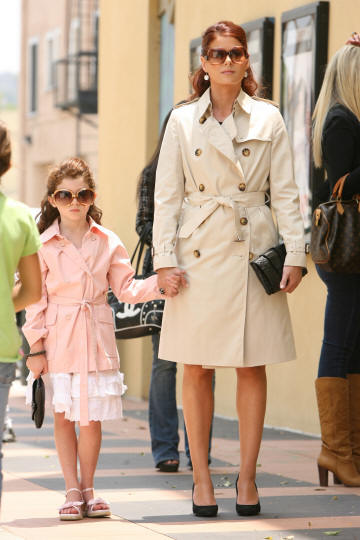 If Molly were your
close friend in real life, what advice would you give to her to help her
achieve her goals after the divorce?
If Molly were your
close friend in real life, what advice would you give to her to help her
achieve her goals after the divorce?
The first thing I would say to her is donít fear change. I think that
Iím someone who doesnít respond well to change. Obviously the character
of Molly is going through a million changes all at the same time and it
could be daunting. I think that I would say look at starting over as an
opportunity to rewrite your life and fill it with everything thatís been
missing.
I know that you
slightly touched on this before. I know that
Will and Grace was
filmed in LA, but it had a strong New York
vibe. The Starter Wife on the other hand is very much an LA type
of show. Was that something that appealed to you, the opportunity to
sort of enjoy and parody the Hollywood lifestyle?
Absolutely. It was just another thing that was completely new for me.
Iím in New York right now. I have a deeper attachment or affinity or
what have you with New York City than I do with Los Angeles. Will
and Grace and my prior sitcom, Ned and Stacy were both
set in New York City. So it has just a complete, it is a completely
different world out in Los Angeles.
The thing that I loved the most about it being set in Los Angeles was
the discovery of the satirical tone of the comedy coming from the social
satire of making fun of this place thatís supposed to be Utopia and
shining a light on some of the uglier sides or shocking sides or sad
sides of the culture that is Hollywood and to get a laugh out of it.
Itís just a completely different kind of approach comedy wise than Iíve
ever had before.
I noticed in the
episodes that I saw that you guys were shooting a lot on location as
well. How does working in real places add to the energy of a scene to
you as an actress? I know youíve done mostly sound stage work in your
previous series.
A lot. It affects it tremendously. We shoot four days on our set and
four days on location. It just adds to the authenticity of the show.
We feel like weíre shooting a film and it adds life and flavor and
colors. And I think as much as you can actually photograph the real
city, the better it is for the series.
Iíd like to ask a
question regarding Lou Manahan (played by Joe Mantegna). I like that
romance that they had in the miniseries and Iím sure it was tempting for
Molly to take the easy way and marry him and have all the riches and
fame. Iím wondering if thereís new potential that they will get back
together in the series.
Well, he comes back. He does several episodes and I think thatís all
Iím allowed to tell you.
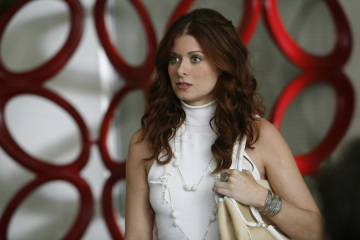 Okay. Fair enough.
And my next question is in looking at your bio, I see that you were
encouraged to get a liberal arts education before you went into acting
and you went on to get a Masterís degree. For new actors coming up
today, is this still advice that youóif someone is coming up, would you
still advise them to get their college education before starting their
acting career?
Okay. Fair enough.
And my next question is in looking at your bio, I see that you were
encouraged to get a liberal arts education before you went into acting
and you went on to get a Masterís degree. For new actors coming up
today, is this still advice that youóif someone is coming up, would you
still advise them to get their college education before starting their
acting career?
Absolutely, absolutely. I just feel like acting is about putting
yourself in the shoes of other people who are different from you. The
more you can learn about the world, about different disciplines, it all
just feeds into making you a better actor. I also think thatís a very
important time in anyoneís life, 18 to 21, and 17 to 22, you are
literally becoming an adult and discovering your point of view and your
perspective and what you value and whatís important to you. So I just
think giving yourself a little cocoon that is intellectually stimulating
and socially stimulating before you have to go out and get pounded by
rejection is a good thing.
Iíve noticed you seem
driven to strong female projects like this series and also the recent
film The
Women, which I really enjoyed. I was wondering is this conscious
choice or is it just like a happy coincidence?
I guess itís both. I wanted to be in The Women seven years ago.
That project, as you know, was around for like twelve years before it
finally got financing. I wanted to be involved because it was this
iconic play and an iconic film and that it was all women, and that with
an awareness that given the business in modern day, that movie would
never be made with no man in it unless it had that precedent from the
original film. So I knew it would be a once in a lifetime
opportunity.
Beyond that, I do feel like we have a responsibility to help highlight
and support the really, really talented women in our community because
it is so imbalanced. Josie and Sara happen to be women and they happen
to be brilliant writers and thatís why I wanted to continue to work with
them was because of their talent.
But it has extended into our directing. We have our directors. We had
a higher than normal percentage of female directors this season. So I
think across the board there is an awareness that where things are
equal, if we can give an opportunity, then itís our responsibility.
Congratulations on
producing. Iíve been a fan of yours since even
Lost in the Clouds and also the Woody Allen film you did
was hilarious. I wanted to ask, do you have any future plans for
producing beyond The Starter Wife?
You know, not at this point. I never really had plans to become a
producer to begin with. It just evolved naturally and now itís
something that Iím really enjoying. My husband is a writer, he created
the TV show, Damages, and we have talked for years and years and
years about working together and maybe starting a production company.
So I imagine at some point, only if a project arises that Iím incredibly
passionate about, will I go on to do something else.
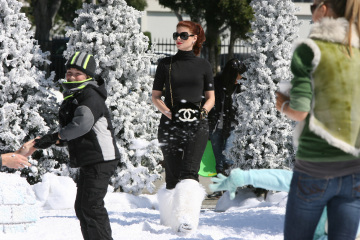 In
Pamela Paulís book,
The Starter Marriage, she said that people got married to be a power couple, to move out of
their parentsí houses or they were just fascinated with weddings. Which
do you think best fits Molly and Kenny?
In
Pamela Paulís book,
The Starter Marriage, she said that people got married to be a power couple, to move out of
their parentsí houses or they were just fascinated with weddings. Which
do you think best fits Molly and Kenny?
Oh goodness. Iíve never heard of that book before, so Iím still back on
that. Can you give me the three options again?
To be a power couple, to move out of their parentsí houses, or just
fascinated with the idea of weddings.
Well, certainly not the third one. I donít think any of them, to be
honest. I think when it comes to Molly; they met when they were living
outside of their parentsí houses already. I think it was love, and
neither one of them had any power at the time. Clearly Kenny had
ambition and Iím sure that that was attractive to Molly when they met.
And that just sort of evolved as his ambition grew and he was able to
move up the corporate ladder, so to speak, and she was able to help him
more and more and more. I think it just happened, it wasnít planned.
Where do you want the
Sam/Molly relationship to go?
That doesnít work out. Sam and Molly donít work out, but I do think it
would be really great if the character of Sam came back. That could
shake things up a little bit.
Do you have any
friends, living in LA, friends or family that you can draw off from the
character of Molly as starter wives?
I have a lot of friends and I have family who live in Los Angeles and
have children in private schools or work in the industry or have been to
five-year-old birthday parties with a tiger in the backyard. So
everybody has a story, so we get stories from every angle and
essentially the more extreme, the funnier.
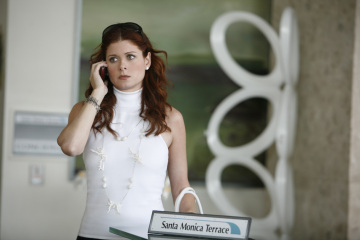 Do you work closely
with Gigi (Levangie, who wrote the novel) a lot with developing the
character of Molly?
Do you work closely
with Gigi (Levangie, who wrote the novel) a lot with developing the
character of Molly?
No, no, not at all. Gigi, she established the character, wrote the
character in the novel and then Josie and Sara, that was the leaping off
point was what was written in the book. And then they took her and
filled her out and made her their own.
There is a term called Mom-terage, which is a momís group of
people who help them as a mom day to day, kind of like how Molly has
Joan and Rodney. I was just wondering if you could talk about whoís in
your Mom-terage.
I feel like on some level, I have my cast at The Starter Wife are
in the Mom-terage because when weíre shooting Iím there every day and so
Roman comes to the set everyday after school. David Alan Basche and
Hart Bochner and Chris Diamantopoulos have all become sort of uncles, de
facto uncles to Roman. They play ball with him and they tickle him and
they read books to him and the same thing with my wardrobe girl and my
make-up artist. Everyone on the set has become like a village, so to
speak, you know, it takes a village. Sara and Josie, of course, theyíre
like aunts as well, so luckily when Iím working I have a big village of
people.
Features Return to the features page